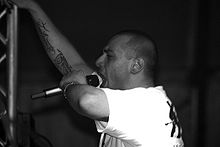Italian hip hop
| Music of Italy | ||||||||
| General topics | ||||||||
|---|---|---|---|---|---|---|---|---|
| Genres | ||||||||
| Specific forms | ||||||||
| Gregorian chant | ||||||||
| Media and performance | ||||||||
|
||||||||
| Nationalistic and patriotic songs | ||||||||
|
||||||||
| Regional music | ||||||||
|
||||||||
Italian hip hop started in the 1980s.[1] One of the first hip hop crews to catch the attention of the Italian mainstream was Milan's Articolo 31, then and still today produced by Franco Godi, who had written the soundtrack to the animated TV series Signor Rossi in the 1970s. The European Music Office's report on Music in Europe claimed that, in general, hip hop from the south of Italy tends to be harder than that from the north.[2]
History
In the early 1980s, hip hop spread to Italy through Posse cuts, which were popular in centri sociali, alternative centers where several left-wing young people regularly met, and where the extremely influential Italian hardcore punk scene was flourishing, from which the Italian Posse Cut movement inherited its social conscious. The first star to emerge from this scene was Jovanotti, who would rap in otherwise standard Italian pop.[3][4][5] While Jovanotti was discovered by the famous producer Claudio Cecchetto and quickly reached fame, in the underground Radical Stuff published the first Italian hip hop street video Let's Get Dizzy featuring lo Greco Bros in 1989. Also that year Marko Von Schoenberg of Stone Castle Records in Italy produced Dre' n OG along with Andre Herring (now known as the King of Art) and Nathaniel Goodwin, with songs such as Ak-47, Got Damn, Do Beat and Spead Your Legs. In 1991 the Posse Cut movement produced its first underground rap in the Italian language, with tracks such as Stop al Panico by Isola Posse All Star, a track against murders and violence in the streets.
Articolo 31, who started out as a mainly East Coast rap inspired hip hop duo, rapped in two commercials (for big companies such as Fiat and Big Bubble) in 1993. The duo had always been criticized for their connection to the Italian pop-music market. In 1996, as they started their performance at Venice's hip hop festival, the others rappers left the stage as a symbolic protest against them. In the next few years a dissing battle started between them and the Zero Stress Crew (formed by Sangue Misto and Radical Stuff). Other important crews and rappers included Bologna's Porzione Massiccia Crew, Sangue Misto (project born from Isola Posse All Star), with their 1994 album SXM, which has influenced all subsequent Italian hip hop.
Among the most popoular Italian rappers are Kaos One, Colle der Fomento, Sacre Scuole, Fabri Fibra, Otierre, Inokiness, Clementino, Noyz Narcos and Caparezza. More recently, two young rappers reached the peak of fame: Fedez and Emis Killa.
In the late 1990s the Death Rap Italian scene was born in Rome with the above-mentioned Noyz Narcos and his Crew Truceklan and the project In the Panchine.

References
- Stokes, Martin (2003). "Ethnicity and Race". In John Shepherd; David Horn; Dave Laing; Paul Oliver; Peter Wicke (eds.). Continuum Encyclopedia of Popular Music of the World, Volume 1: Media, Industry and Society. London: Continuum. ISBN 0-8264-6321-5.
Notes
- ^ "BBC News - Jovanotti in New York: Italy's first rapper moves to the home of hip hop". Bbc.co.uk. 2012-11-19. Retrieved 2014-02-24.
- ^ "Hip Hop and Rap in Europe. The culture of the urban ghetto's". Icce.rug.nl. Retrieved 2014-02-24.
- ^ "A Roman Rapper Comes to New York, Where He Can Get Real". The New York Times. Retrieved 2014-02-24.
- ^ "Jovanotti Brings Italian-Style Hip-Hop to US | Public Radio International". Pri.org. Retrieved 2014-02-24.
- ^ Khan, Imran. "Dreadbeat: Italian Rapper Luche's "Chi Non Dimentica"". PopMatters. Retrieved 2014-02-24.
External links
- Joe Sciorra 's site about Italian Hip Hop
- Zero-plastica 's site hip hop underground from Italy genova
- Italian-based hip hop site supplying international exclusives (news, interviews, audios, videos, gallery)
- Italian Hip Hop Portal which includes a large database of Italian as well as International (mainly US) artists
- Brief overview of Italian Hip Hop
- Hip Hop Selection - Daily news and links about Italian and international Hip Hop
- List of Italian rapper
